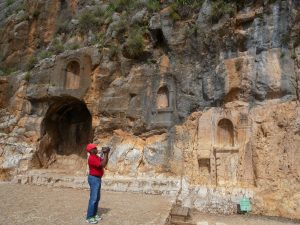WEEK 18 04
Faith Like a Rock – Key to the Kingdom
Memorial: St Dominic de Guzman
(Num 20:1-13; Ps 95; Mt 16;13-23)
**************************************
A woman who promised her husband she was only going window shopping returned with a very expensive dress. Upset, he asked her why she did that when she had promised not to buy anything? She replied it was so beautiful and so tempting, she could not resist buying it. Being a person of faith, he asked her why didn’t she do what Jesus did when tempted, and say “Get behind me Satan?” She replied she did that, and he whispered in her ear, “It looks even better from behind” so she bought it!
Powerful archetypal readings today invite us to deeper faith in Jesus that will unlock the key to the kingdom of God. The delicate yet deliberate connection between the reading from Numbers and the Gospel offers some deep lessons about the difference faith and trust in Jesus can make in our lives.
In that first reading, the Israelites struggle with weak faith – complaining, thirsting for water, arguing with Moses and Aaron. Moses, their leader, acts on faith, yet falls short in faith by striking the rock twice in bringing forth water in the desert. The result is that God tells him he won’t take the people into the promised land because he did not trust God completely.

Niches for the gods at Caesarea Phillipi
In the gospel, Jesus is in Caeserea Philippi, a crossroads at that time where culture, commerce and cult in the form of many pagan religions met and inter-acted. In that setting, Jesus asks the key question about his identity, and after a variety or responses, Peter professes a wonderful, inspired faith in Jesus as “the Messiah, the Christ, the Son of God.”
Delighted with this statement, Jesus responds by proclaiming Peter would be the rock on which Jesus would build his church, from which living water would flow out to the world. On top of that, Jesus would give Peter the “keys of the kingdom of heaven” with the power to bind and loose.
Then a paradox – Jesus mysteriously announces what in the gospel of Mark is called the “Messianic secret” – they are not to tell anyone that he was the Messiah. After that stern admonishment, Jesus predicts his passion, telling his disciples “that he must go to Jerusalem and undergo great suffering at the hands of the religious leaders, be killed and on the third day be raised.”
Here is where Peter, like Moses, falls short in faith – not understanding how Jesus could be both the Messiah and suffer, and protesting against it. Peter is not alone in this perception. Islam also has no concept of a “suffering God” – for them, that is blasphemy. A suffering Messiah is unique to Christianity. The result of this objection by Peter is some harsh language from Jesus, seemingly calling Peter Satan. Some would say Jesus was looking beyond Peter to Satan himself, and telling him to get behind him.
What was happening is that Peter went from powerful faith to suddenly representing a problem at that time, which is also a very modern problem today – our inability to understand the purpose and meaning of suffering, and the concomitant almost obsessive effort to avoid it at all costs. The result is a profound lack of respect for life at both ends of the spectrum – leading to especially physician assisted suicide for the elderly, because we cannot have them suffering. And in between there is an epidemic of opioid addiction, because people no longer know what to do with their pain – it has no meaning for them. As one psychologist in Ottawa put it “We used to think the enemy was death – now we know it is suffering.”
There are some deep lessons in these two readings for us centered on faith. A first is the call to not only understand the role suffering is meant to play in our lives, but to also be ready to be radical disciples who can accept suffering without bitterness or resentment. We are to be like Jesus who was led to his crucifixion like a lamb being led to slaughter. There was only compassion and forgiveness in him – caring for others to the end, and forgiving those who were crucifying him.
This is actually the key to the kingdom – to understand the brokenness of Jesus on the cross, the power of powerlessness, the true nature of love that seeks only to forgive rather than exact revenge, to accept suffering as Jesus did, without bitterness or resentment.
A second lesson flows from the first. Jesus gives to Peter, and to the Church, the power to forgive, the power to make heaven happen here on earth. Whatever we forgive here, is forgiven in heaven, and concomitantly, what we refuse to forgive here, is held back in heaven. We are given the power to help build up the kingdom of heaven on earth, and that key to the kingdom is given to all of us.
A third lesson is the nature of the Church. Pope Francis once stated it is not a good idea to try to have a personal relationship with Jesus that is not connected to a community of faith. The Church is the body of Christ, and we cannot separate the head from the body. In that sense, it is actually impossible to be an isolated, individual Christian – that is to be a non-entity! Here is a very mature reflection by Cynthia in Katherine Dowling Singh’s book The Grace of Livingabout the relationship between spirituality and religion that some try to separate:
“I think it is ultimately very difficult to be spiritual but not religious, because the deeper waters of transformation all flow through the deep lineages of the specific traditions. It’s very hard to go through that ego boundary, to really get through it, without actually bowing the knee and the heart to a lineage and a teaching and a teacher. That brings the heart dimension in, in a powerful and traditional way.” (p. 193)
A final lesson from these readings is that faith gives us the power to resist the temptation to become overly-attached to especially possessions and pleasure, prestige and fame, power and control. Those are the temptations that beset us every day and all the time. Faith in Jesus offers us a security in God’s love for us that makes it easier for us to say “no” to those temptations when they batter us with their illusionary attractiveness.
 Today the Church celebrates the memorial of St. Dominic de Guzman, who excelled in faith and lived it in an exemplary manner. Born in Caleruega, Spain, around 1172, he began his priestly life in Osma as a cathedral canon. In 1205, he and bishop Diego of Osman were sent to France to combat the Albigensian heresy. The Albigensians believed all matter was evil and all good resided solely in the spiritual realm. Dominic worked tirelessly to defend the truth of the Incarnation. By 1216, Dominic had founded the Order of Preachers (Dominicans) and soon had houses in all the university cities in Europe. The priests were highly educated and could be sent where the need was greatest, fighting heresy and preaching the importance of the sacraments. Dominic himself walked from city to city, preaching and inviting vocations. He stressed education, poverty and community life while being involved in the world, contrary to the rich Benedictine monasteries of the time.
Today the Church celebrates the memorial of St. Dominic de Guzman, who excelled in faith and lived it in an exemplary manner. Born in Caleruega, Spain, around 1172, he began his priestly life in Osma as a cathedral canon. In 1205, he and bishop Diego of Osman were sent to France to combat the Albigensian heresy. The Albigensians believed all matter was evil and all good resided solely in the spiritual realm. Dominic worked tirelessly to defend the truth of the Incarnation. By 1216, Dominic had founded the Order of Preachers (Dominicans) and soon had houses in all the university cities in Europe. The priests were highly educated and could be sent where the need was greatest, fighting heresy and preaching the importance of the sacraments. Dominic himself walked from city to city, preaching and inviting vocations. He stressed education, poverty and community life while being involved in the world, contrary to the rich Benedictine monasteries of the time.
The Friars had a lasting impact on mediaeval Europe fighting heresy and altered the course of Church life with a well thought out and rational response to the new learning that was appearing as Aristotle was becoming known again in the Christian West. Two or three times he was chosen bishop, but always refused, preferring to live with his brothers in poverty. Throughout his life, he preserved the honor of his virginity. He desired to be scourged and cut to pieces, and so die for the faith of Christ. Of him Pope Gregory IX declared: “I knew him as a steadfast follower of the apostolic way of life. There is no doubt he is in heaven, sharing in the glory of the apostles themselves.” When he died at Bolognas in 1221, the order had already begun to flourish. He was canonized in 1234 and is a patron saint of the Dominican Republic, astronomers, scientists and the falsely accused.
The Eucharist is a profound act of faith and an experience of God’s unconditional love as forgiveness and healing. May our celebration deepen our trust in Jesus as Messiah and Son of God. May it also empower us to build up the kingdom of heaven here on earth by forgiving those who hurt us and accepting suffering in our lives as did Jesus, and St. Dominic.




We are to experience some redemptive sufferings in our lives to deepen our understanding and relationship with Jesus Christ. The world is full of hatred and negative things like stubbornness, bitterness, anger, fame and resentments . Most of us will go through these aspects in our lives that can be difficult and smooth when be tempted by evil spirits. We are all sinners until we reach towards the light and ask God to forgive us for our sins . We must learn to forgive people who have hurt us over the years and love them with compassion and gratitude. These are the lessons that Jesus taught us over and over again because he did the same thing when he died on the cross. He learn to forgive us and love us in return. He always forgives us and loves us no matter how many sins we committed against him. We can build the kingdom of heaven on this earth by follow his law or Ten Commandments . He will eventually heal us fully and we will be sanctified. Amen. Amen. Praise to you Lord Jesus Christ.
Thanks again for the beautiful and lovely homily and reflections . May God Bless You! Bishop Sylvain Lavoie.